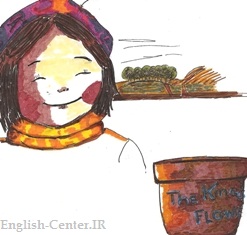یک داستان کوتاه و زیبای انگلیسی
The king and the flowers
A king had a wonderful talent for growing flowers and was looking for someone to succeed him. He decided he would let the flowers decide so he gave everyone a little seed. The one who would produce the most beautiful flower from the seed would be the next king.
A girl called Serena was overwhelmed by the beauty and determined to grow the most beautiful flower. She planted it in a nice pot, took great care for it, but nothing would grow.
The next year she saw everyone gathering at the palace with pots full of beautiful flowers. She was disappointed but also went to the meeting with her empty pot. The king inspected all the flower pots and then stopped at hers.
'Why is your pot empty?, he asked.
'Your highness, I did everything to make it grow, but I have failed', she answered.
'No, you didn't fail', he replied.' You see, the seeds I've given out were all roasted, so nothing could come out of them. I have no idea where all these flowers come from. But you have been honest and by being so, have deserved to be my heir. You will be our queen'.
King: پادشاه
Wonderful: فوق العاده , شگفت انگیز
Talent: استعداد
Growing: کاشت
Seed: دانه
Produce: تولید کردن
Overwhelmed: غرق در اندیشه شدن
Determine: تصمیم گرفتن
Pot: گلدان
Gathering: جمع آوری
Disappointed: ناامید
Inspect: بازرسی کردن
Fail: شکست خوردن
Roasted: سرخ شده , کباب شده
Honest: صادق
Deserve: سزاواربودن , شایستگی داشتن
Heir: وارث , جانشین شدن
Queen: ملکه









 پاسخ با نقل قول
پاسخ با نقل قول


علاقه مندی ها (بوک مارک ها)